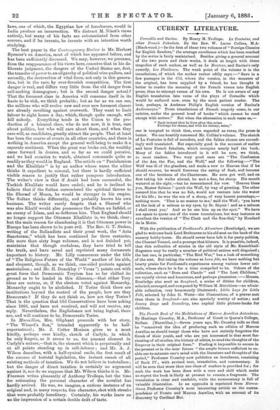CURRENT LITERATURE.
Corneille and Racine. By Henry M. Trollope. La Fontaine, and other French Fabulists. By the Rev. W. Lucas Collins, M.A. (Blackwood.)—In the first of these two volumes of "Foreign Classics for English Readers," the average excellence which has been reached by the series is fairly maintained. Besides giving a general account. of the two poets and their works, it deals at length with three tragedies of each author, as well as Le Menteur, and Racine's only comedy, Les Plaideurs. The weak point of the volume is in the translations, of which the author rather oddly says :—" Save in a few passages in the Cid, where the version, in the measure of the original, has been supplied by a friend, he has thought it better to render the meaning of the French verses into English prose, than to attempt verses of his Own. He is not aware of any English translation into verse of the plays of Corneille which would be endured now, even by the most patient reader. The best, perhaps, is Ambrose Philip's English version of Racine's Andromaque." Prose translations of French tragedy come, in our opinion, under the general head of books "which cannot be read except with sorrow." But when the alternative is such verse as,- " Each instant that he lives after this crime Prolongs his shame, and with his infamy, mine," one is tempted to think that, even regarded as verse, the prose is better. We can heartily commend Mr. Collins's volume. The sketch of La Fontaine is full of anecdote, and the fables chosen are exceed- ingly well translated. But especially good is the account of earlier and later French fabulists, which occupies nearly half the book. Many of the fables introduced in it will be new, we think, to must readers. Two very good ones are "The Confession of the Ass, the Fox, and the Wolf," and the following :—" The Wolf was ill of the glanders, and made a vow to Heaven that if he should recover, he would forswear the eating of flesh, and become one of the brethren of the -Chartreuse. He soon got well, and on first taking his walks abroad, he met -a fine, fat sheep. His month watered at the sight,—but he remembered his vow. 'Heaven bless you, Master Salmon !' quoth the Wolf, by way of greeting. The other assured him that he was no fish, would not venture into the water for his life ; he-was the son of a sheep, of very honest parentage,— nothing more. That is no matter to me,' said the Wolf ; yen have all the look of a salmon to my eyes, by St. Signal! and as a salmon I shall treat you.' And so he ate him up on the spot." We have not space to quote one of the verse translations, but may instance as excellent the version of "The Clock and the Sun-dial," by Hondard de la Motto.














































 Previous page
Previous page